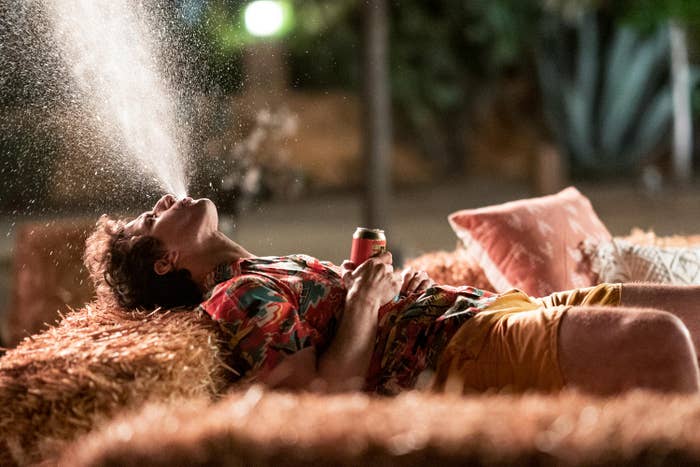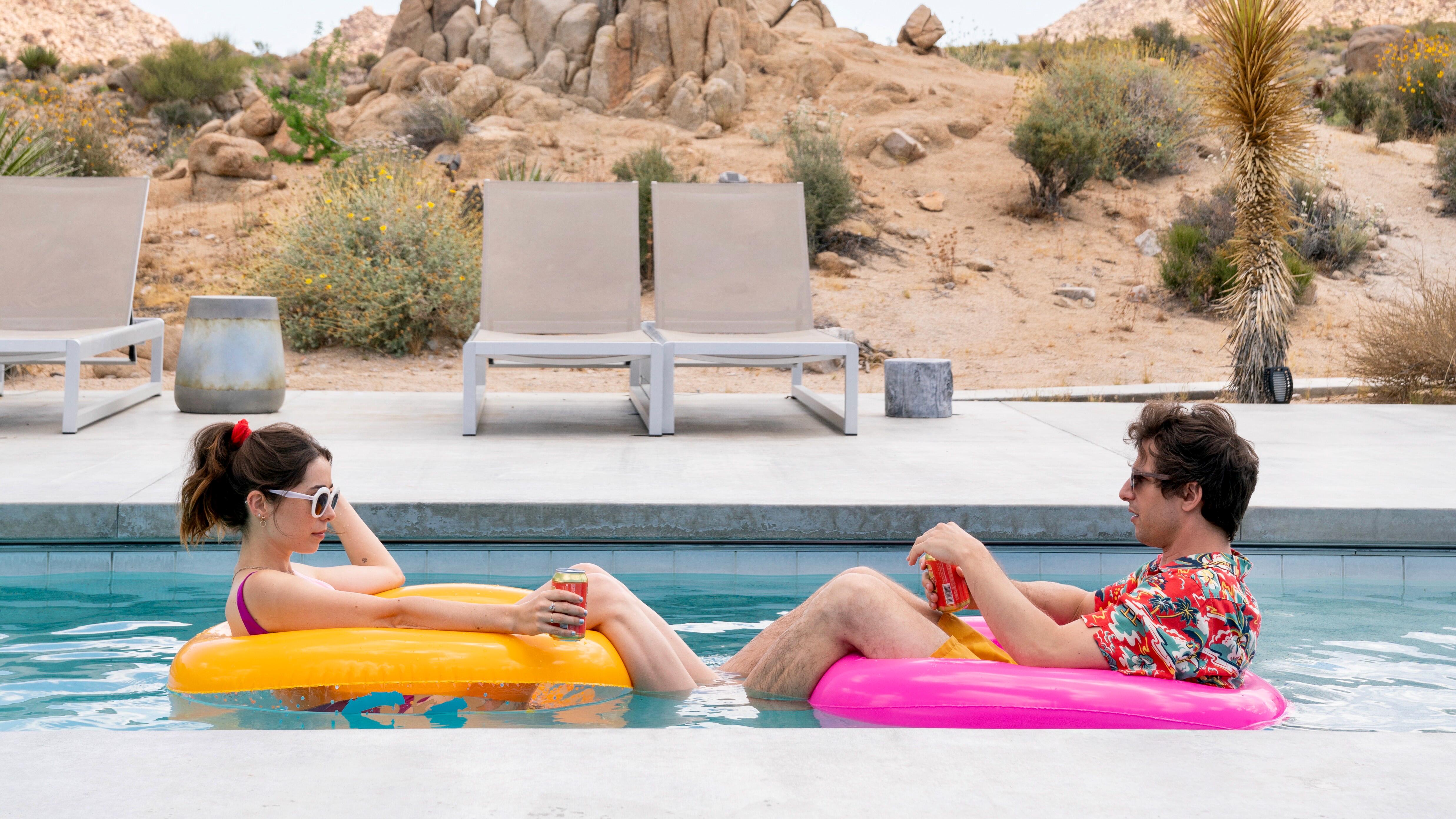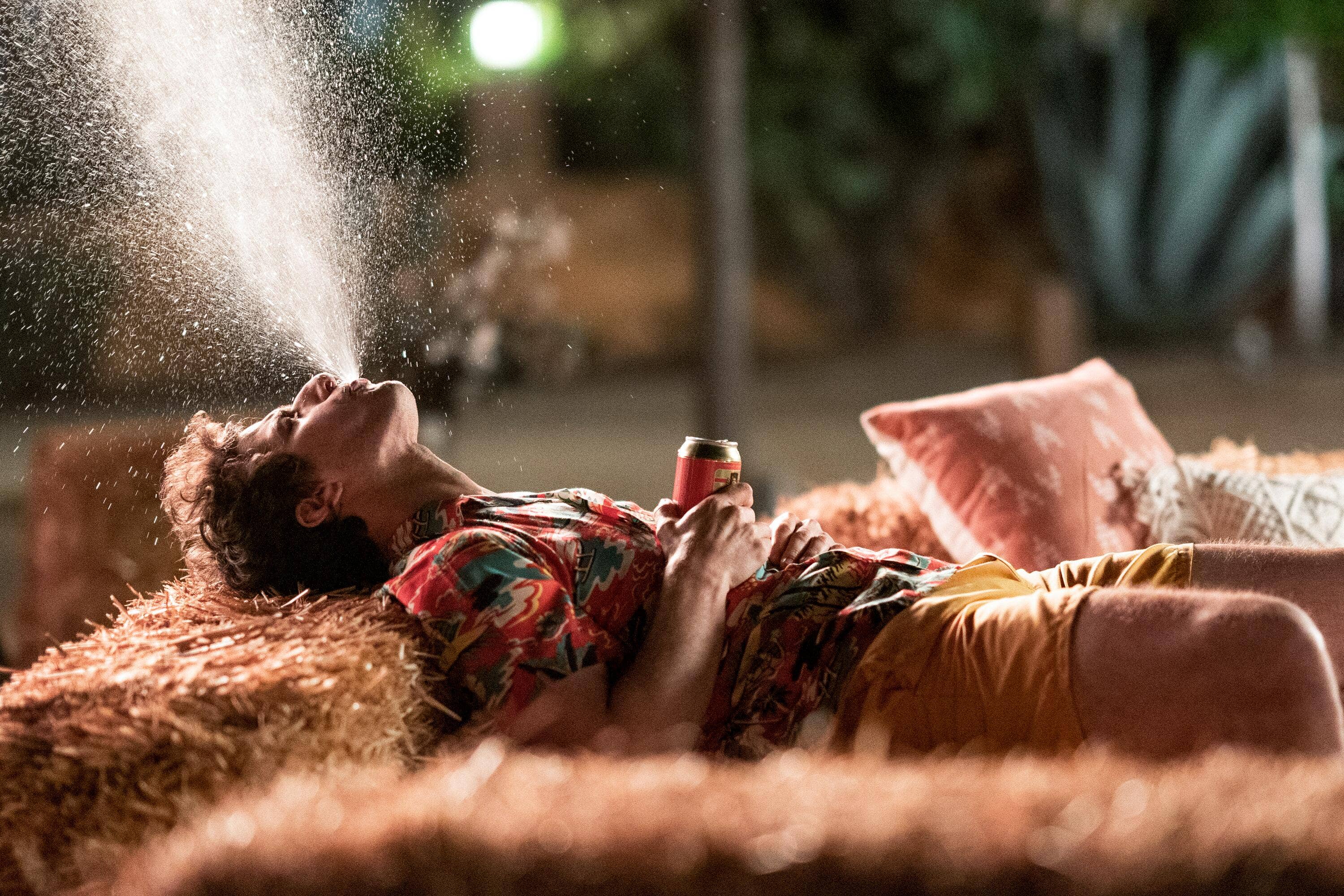
For millennials such as myself, Saturday Night Live’s run from 2008 through 2013 largely defined our generation’s comedic personas. The core, absurdly talented MVPs of that era like Kristen Wiig, Bill Hader, Seth Myers, and Fred Armisen have left the show and springboarded to greater heights. But for as memorable as those performers are, the cast member who quickly came to represent the millennial sense of humor, and in some ways help define it, was Andy Samberg. And while the actor/comedian/producer is getting his flowers for his work in Hulu and NEON’s newly released Palm Springs, diehards will tell you Samberg has always been this good—and he’s still getting better.
It was Samberg’s now-infamous “Lazy Sunday” which attuned me—and many viewers—to his particular brand of comedic stylings. At the core of the video was Samberg; his goofy, expressive face contrasted with his sincerity about getting hyped for Sunday movie matinee. The whole video felt like Samberg and his childhood friends turned collaborators Akiva Schaffer and Jorma Taccone—collectively known as The Lonely Island—had mined my skull, cherrypicking all the right things I loved, and rolling them into a perfect bit of comedy. The sketch is just as funny 15 years later—and that’s even before you get to a weirdly prescient Aaron Burr/Alexander Hamilton joke. Samberg and the rest of The Lonely Island gleefully expanded their ambition, scope, and talent with no premise too far afield. A riff on Bonnie and Clyde wherein Clyde has performance anxiety? Gold. Pansexual dudes who are enjoying one last frat-tastic Spring Break ahead of committing themselves to their future husbands? Amazing satire. Onandonthe brilliance went as Samberg helped to define both YouTube and viral videos in equal measure while establishing SNL as appointment viewing to see what the group’s chaotic reign would bring next.
In spite of The Lonley’s Island’s anarchy, Samberg’s leading presence in these sketches provided an ever-persistent goofiness balanced by an everyman affability. It’s a useful skill that helped to ground the group’s most absurd moments. It’s also a tightrope that’s taken larger audiences some time to fully suss out—especially when looking at his projects outside of Saturday Night Live. Hot Rod is a ridiculous comedy about the arrested development of a wannabe stuntman in a small town. It’s also a moving story about the search for paternal acceptance. Popstar: Never Stop Never Stopping is just as much a This is Spinal Tap (with excellent jokes and incrediblemusicalnumbers) for the Justin Bieber generation as it is an exploration of why Schaffer, Taccone, and Samberg will always work well together creatively. Even projects that are seemingly disposable—like Netflix’s 2019 The Unauthorized Bash Brother Experience—mange to be deviously smart in the way it garners absolute hilarity out of being too roided out to finish having sex or the burdens of being a successful athlete.
In many ways, time has been Samberg’s best friend. Hot Rod and Popstar eventually flourished after they’d been stripped of their initial expectations. Samberg seems happy to plant (cool) beans and let them sit until suddenly, without warning, they explode into fully formed comedic beanstalks. But in those films, the characters aren’t dissimilar from the roles that defined his SNL Digital Shorts. Samberg isn’t changing for audiences but instead waiting for them to catch up. Some of that has happened already; while Brooklyn Nine-Ninewill certainly change in the wake of recent events, the show functions best when Samberg’s Jake Peralta (a role in which he won a Golden Globe) gets to be as weird as possible within his own surreal work family. The show creates a Cheers-esque environment by just being a deeply pleasant hangout show, complete with a tone that’s equal parts warm and hilarious in its own way.
But if the initial reaction to Palm Springs is any indication, audiences have finally caught up. [Ed. note: Spoilers for Palm Springs follow.] The biggest Sundance seller of all time by a nice amount features the actor at his most Sambergian, clad in a bathing suit and a Hawaiian shirt. Samberg’s Nyles has already been living in “one of those infinite-time-loop situations that you might have heard about” for quite some time before Cristin Milioti’s Sarah inadvertently joins him. Nyles has fully accepted his fate, declaring to Sarah in between sips of beer, “I decided a while ago to sort of give up and stop trying to make sense of things altogether because the only way to really live in this is to embrace the fact that nothing matters.” Nyles’ cynical affect may appear to fly in the face of what we typically expect from a Samberg character, but he’s explored nihilism before in his work with Lonely Island (Bash Brothers, in particular, has heaps of it). But it’s typically been deployed in service of a joke. In Palm Springs, the dourness stands in equal measure with the comedy; neither part ever threatens to overtake the other. This helps to foster a tone for the film that’s serious but never depressing or joyless. It’s a deeply smart execution of two opposing ideas that Samberg masterfully balances, making the whole movie feel like a watershed moment for him in terms of showing audiences the true breadth of his range.

Palm Springs is full of contradictions. It’s heartwarming in the face of an oppressively dour circumstance, equal parts comedy and drama, immature yet adult, and trenchant in a way he’s always been. After all, who hasn’t felt like they’re living their own version of Groundhog Day as quarantine continues? Palm Springs, based on premise alone, was always going to draw comparisons to Bill Murray’s breakthrough hit—but there’s far more overlap than you’d anticipate. Palm Springs fashions a more dramatic role for Samberg to play in the same way that Groundhog Day did for Bill Murray. Murray was 42 when Groundhog Day came out; Samberg is 41. Not quite an infinite time loop, but a loop nonetheless. Where the two films differ, however, is where the brilliance of Springs arises. Including Milioti’s Sarah adds a breath of fresh air to a well-worn premise and she serves as an excellent partner for Samberg’s inherent goofiness. The duo doesn’t break the loop by letting the universe determine what happens, rather, the characters conclusively go their own way. The results are staggeringly refreshing.
Palm Springs doesn’t seem reversed engineered to be a hit vehicle for Samberg. It’s just focused on being the best film it can be by leveraging what’s always made the comedian great. That’s a lesson more films could stand to take as the actor looks at what’s next. The more dramatic portions of Springs prove Samberg is more than capable of handling weighty material while still managing to find moments that speak to his sense of comedic timing. It’s not hard to imagine him working with a creative who could really help Samberg tap into the potential of something serious—perhaps in a similar way that Wes Anderson leveraged Bill Murray in Rushmore for example. But even if that’s not the direction Samberg decides to head, he’s still a creative force to be reckoned with; his track record as a producer on Hulu’s PEN15 and Netflix’s I Think You Should Leave highlight his expertise at finding new voices in the realm of comedy to spotlight for a new generation.
Regardless of what he chooses to do next, the future seems wide open and exciting for the comedian in a way that it quite hasn’t before. Palm Springs reconfirms Samberg as a major talent, sees him level up in an exciting way, and proves he’s capable of so much more than raps about being on a boat. But as he famously reminded us in that song, “anything is possible.” It might have been a joke back then—but it’s certainly a fact now.


